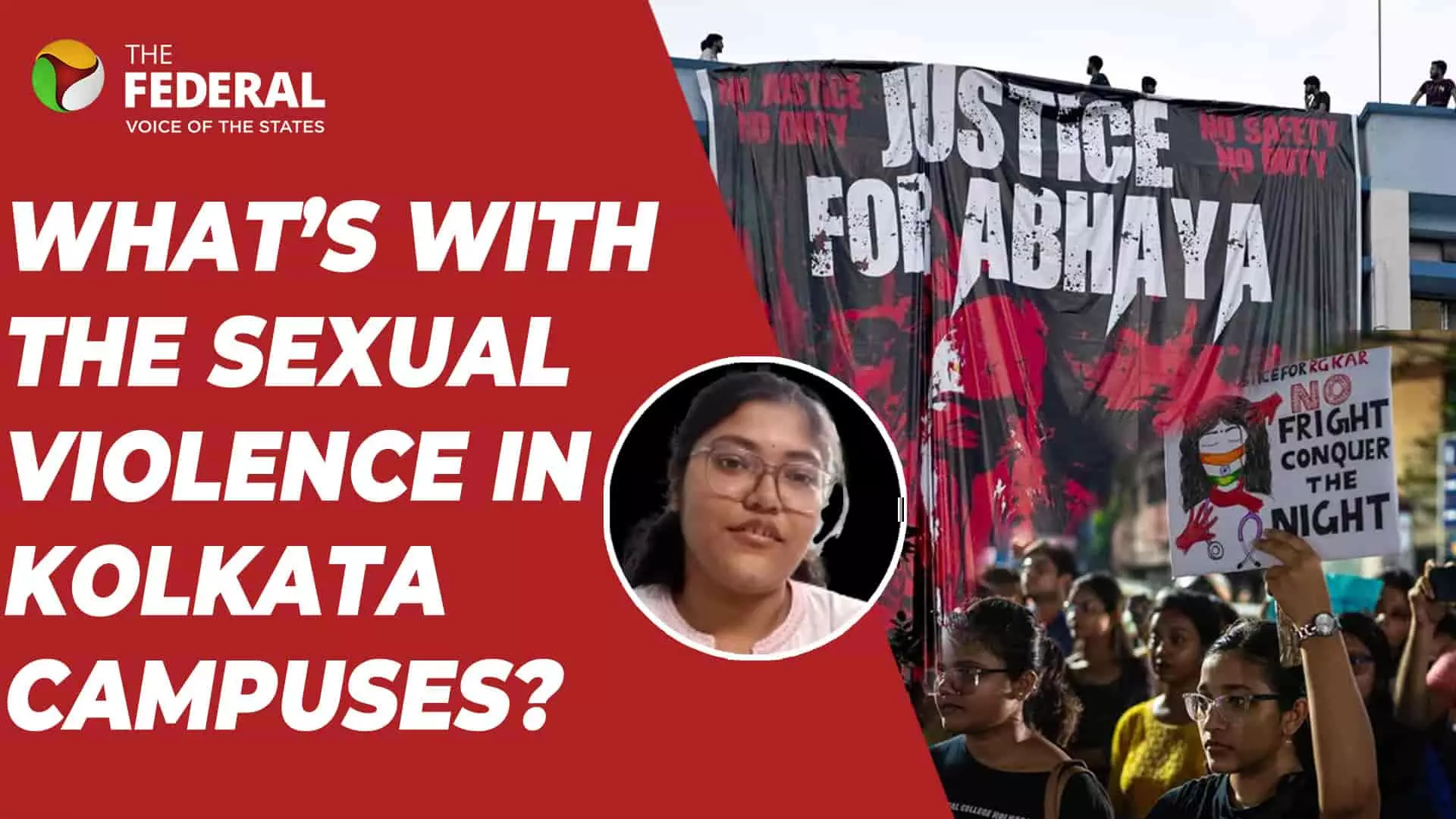
Kolkata law student rape: 'Like RG Kar movement, we are planning big protests'
Student activist Arya Das breaks down the structural rot, political complicity, and what it will take to make campuses safe for women again in Kolkata

In the wake of two shocking crimes — a junior doctor’s rape and murder at RG Kar Medical College and the gangrape of a law student at South Kolkata Law College — concerns over women’s safety in Kolkata have deepened. The Federal speaks with Arya Das, a student leader and social activist, about what went wrong and what needs to change.
Kolkata is often seen as one of India’s safest cities for women. After these recent brutal cases, how safe do you believe the city is for women today?
If you look at the numbers, Kolkata is indeed in an alarming position right now. But I would not conclude that it is the most unsafe city. Compared to cities like Delhi, Kolkata still reports a lower percentage of such crimes.
However, I believe no city is truly safe unless it provides democratic spaces where people can raise their voices against structural oppression and wrongdoing — whether by the state or individuals. A city is safe only when justice is delivered and the guilty are punished. In that sense, Kolkata remains in an alarming position.
What do you think has gone wrong in the ecosystem of educational institutions that has allowed such brutal acts to occur even on campus?
There has been an absolute lack of campus democracy. After COVID, no student union elections have been held. The state seems to be deliberately suppressing these elections to protect its own interests. Without proper student bodies, there’s no one to represent students or raise concerns on their behalf.
In both the R.G. Kar Medical College and South Kolkata Law College cases, we saw how the absence of campus democracy and the influence of government-backed student organisations contributed to these tragedies.
There’s also been infrastructural failure. Colleges and universities are severely underfunded, resulting in poor facilities, inadequate security, and insufficient faculty. The curriculum itself, shaped by the National Education Policy, discourages political engagement and focuses purely on commercialisation, leaving no room for student activism or democratic discourse.
Do you think the RG Kar protest movement failed to create a lasting deterrent against gender-based violence?
The R.G. Kar movement did have an impact. It inspired the courage we saw in the recent victim, who, despite threats, came forward and exposed her attackers publicly. That takes immense courage, especially when your social reputation and safety are at stake.
However, I also question the role of mainstream media. Are they truly practising ethical journalism, or indulging in sensationalism? Every day, we see such incidents, and while media attention is important, it’s equally crucial that the reporting is neutral and responsible.
The threat culture persists, but the public outcry we see today is in part due to the precedent set by the R.G. Kar protests.
What concrete steps—socially, institutionally, or legally—are needed to counter this moral and social decline?
First, we urgently need student union elections. If there had been an active student union at South Kolkata Law College, the hiring of Munujit Mishra — one of the accused — might have been questioned or prevented.
We also need to build socio-political awareness among students and citizens. Without democratic engagement on campuses, these problems won’t resolve on their own.
I strongly oppose the National Education Policy 2020. It imposes academic and economic pressures that push students out of public education and erodes secular, scientific, and democratic education. The curriculum has been saffronised to serve the narrow interests of the government, and this must be resisted.
Ultimately, the government must be pressured to provide the basic safety and infrastructure students deserve.
Are you planning any large-scale protests or awareness movements to demand accountability and push for systemic change?
Yes, we are planning larger protests. The RG Kar movement’s massive public upsurge inspires us. But activists who led those protests have faced retaliation that tries to prevent further mobilisation.
This is the time to raise our voices against structural oppression, consumerist culture, and power-centric politics that enable such crimes. We must build sociopolitical awareness and demand what we deserve as students—to study and work in safety.
The content above has been generated using a fine-tuned AI model. To ensure accuracy, quality, and editorial integrity, we employ a Human-In-The-Loop (HITL) process. While AI assists in creating the initial draft, our experienced editorial team carefully reviews, edits, and refines the content before publication. At The Federal, we combine the efficiency of AI with the expertise of human editors to deliver reliable and insightful journalism.

